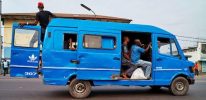Congolese police raided the privately owned television production studio Kin Lartus, detained at least 10 of the studio’s journalists, and seized equipment, according to Kin Lartus journalists and a local, independent press freedom group.
The Committee to Protect Journalists (CPJ) today urged authorities to return confiscated materials and cease its campaign of intimidation against the press.
Two plainclothes police officers on the afternoon of July 25 arrived at the Kin Lartus studios in Kinshasa and were followed by at least 12 uniformed officers with guns several minutes later, according to Pierrot Etumba and Jean Jacques Kabeya, both journalists at Kin Lartus and a report from Journalistes en Danger.
Maki Makiese, Kin Lartus’s lawyer, told CPJ that police arrested 10 journalists that work on Kin Lartus’ daily news show: Jean Jacques Kabeya, Kin Lartus’ director and chief editor; Herithier Mbula, a video editor; Fretas Mbamanku, a cameraperson; and reporters Doya Mayi, Ritha Musau, Jules Ntumba, Jazz Nyembo, Espérant Kabemba, Fretas Mbamnku, Issa Kazadi, and Grace Luntela.
Six of the 10 arrested journalists–Mbula, Ntumba, Nyembo, Kabema, Kazadi, and Luntela– were released the same day, according to Kin Lartus editor Pierrot Etumba, who was among the six. The other four– Kabeya, Musau, Mayi and Mbamanku–spent two days in detention and paid police US$260 in total to be released unconditionally on July 27, Etumba told CPJ. Makiese told CPJ that police demanded the money before releasing the journalists, but that the payment was not part of an official bail or fine.
Kin Lartus’ daily news show is broadcast on various channels in Kinshasa and the studio produces content for a variety of outlets, according to Kabeya.
“Kinshasa police must return the equipment taken from the Kin Lartus studio and allow studio employees to continue their reporting without fear of retaliation from the government,” CPJ Africa Program Coordinator Angela Quintal, said from Harare. “Journalists in the DRC are too often forced to work in fear of security services who feel free to flout the law.”
CPJ’s repeated calls to Joachim Mumbulu, the Kinshasa police officer who Makiese said ordered the journalists’ arrest and release, went unanswered. CPJ requested comment from two other officers who only gave their first names, Colonel Bady and Captain David, but both declined and referred CPJ to the officer in charge of the case.
No charges were filed against the journalists, according to Makiese.
According to the lawyer, police during the raid seized six laptops, three hard disks, two cameras, one tripod, and US$4,250 in cash. “We have only been able to get back some of the materials. They still have our hard disks, a computer, and a camera,” Makiese told CPJ.
“My computer and my two mobile phones are still with the police. I had to borrow a computer in order to keep working,” Kabeya told CPJ.
According to the DRC constitution, police, who have military status in the DRC, can hold individuals for up to 48 hours without charge, but Makiese told CPJ that the raid on the station was illegal because it violated section two of the Congolese military penal code prohibiting “abuse of authority” and “abuse of the right of requisition.”
The raid came after Petito Kilala, the promoter of a television program called “Kilartus,”–which appears on a network with the same name–filed a civil lawsuit against Kin Lartus claiming that one of the production studio’s television shows wrongly used Kilartus’ logo and name, Makiese said.
Makiese told CPJ he believed that the raid was prompted by Kilala’s lawsuit, which Kilala denied during an interview with CPJ.
CPJ was unable to confirm independently any link between the lawsuit and the raid.

